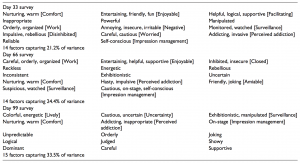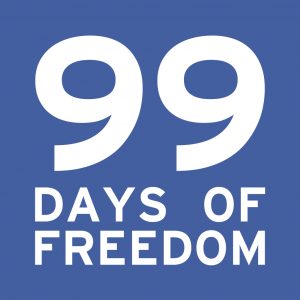The previous blog 99 Days of Freedom: Will YOU return to FB after quitting? says that the adjectives participants wrote in their responses can indicate their likelihood to return to Facebook.
Figure 1. Logo for 99 Days of Freedom. Facebook users who took the pledge were encouraged to change their profile picture to this image.
(Source: 99daysoffreedom.com)
99 Days of “Freedom”.
The first survey asked,
1.“Select the words that best describe your experiences, perceptions of, and attitudes about the 99 Days.”
The subsequent surveys asked,
2. “How do you feel about [the pledge] since the last survey?”
The results are displayed in Table 1 below.

Table 1. Factor analysis results across the three data sets. For factors with multiple high loadings, we manually assign a [Label].
We suspect that respondents likely used these adjectives in part to describe their experiences of the pledge and in part to describe how taking the pledge altered their perceptions of Facebook.
Respondents who chose adjectives associated with the Surveillance factor (e.g., watched, monitored, on-stage) were less likely to revert. Their experiences during the pledge were associated with an increased feeling of being surveilled on Facebook, which helped them to stay away from Facebook.
Experiences around impression management (e.g., on-stage, self-conscious) predicted increased likelihood of reversion. The 99 Days of Freedom pledge led some respondents to think more about Facebook in terms of impression management. As a result, returning to Facebook means having better control over perceptions of their online identities.
Those who focus on managing their impressions on Facebook were more likely to revert, while those who felt judged were less likely. Additionally, respondents who felt manipulated by, and perhaps who were rebelling against, Facebook were less likely to revert.
|
Is it likely for you to feel being watched or being judged when you go on Facebook? Do you consider Facebook as a platform for impression management? Leave us a comment! |
Reference
Baumer, E.P.S., Guha, S., Quan, E., Mimno, D., & Gay, G. (2015). How Non-use Experiences Influence the Likelihood of Social Media Reversion: Perceived Addiction, Boundary Negotiation, Subjective Mood, and Social Connections. Social Media + Society.

One comment